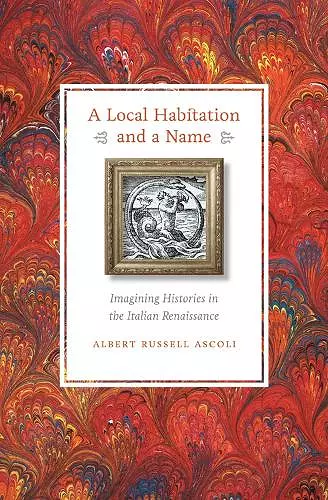A Local Habitation and a Name
Imagining Histories in the Italian Renaissance
Format:Hardback
Publisher:Fordham University Press
Published:1st Sep '11
Currently unavailable, and unfortunately no date known when it will be back
This hardback is available in another edition too:
- Paperback£35.00(9780823234295)

Examines the unstable dialectic of reality and imagination, as well as of history and literature
Focusing on major authors and problems from the Italian fourteenth and sixteenth centuries, from Petrarch and Boccaccio to Machiavelli, Ariosto and Tasso, A Local Habitation and a Name examines the unstable dialectic of “reality” and “imagination,” as well as of “history” and “literature.” Albert Ascoli identifies and interprets the ways in which literary texts are shaped by and serve the purposes of multiple, intertwined historical discourses and circumstances, and he equally probes the function of such texts in constructing, interpreting, critiquing, and effacing the histories in which they are embedded. Throughout, he poses the theoretical and methodological question of how formal analysis and literary forms can at once resist and further the historicist enterprise.
Along the way Ascoli interrogates the mechanisms of historical periodization that have governed for so long our study of what is sometimes called the “Renaissance,” sometimes the early modern period. He also addresses the period’s own unstable version of the literature/history opposition, the place of gendered discourse in the construction of historical narratives (and vice versa), the elaborate formal strategies by which poets and intellectuals negotiate their relations to power, and, finally, the way in which proper names (of authors, works, and exemplary characters) serve as points of negotiation between individual identity and social order in the Renaissance.
The book brings to culmination two decades of a major scholar’s thinking about some of the most important figures and questions that shaped the Renaissance, with emphasis on the question of history, both the historical context of literature and the writing of literary history.
. . . A rich feast . . . in which all students of Italian Renaissance literature will find substantial food for thought. * —Renaissance Quarterly *
Combining uncommon erudition with a rigorous commitment to critical theory,Albert Ascoli masterfully illuminates the cultural interlacing of power and knowledge—of “cesare” and “poeta”—in early modern Italy. Whether showing how Petrarch uses his letters to define the place of the man of letters in relation to those in power, examining the literary dimension of Machiavelli’s anti-literary treatise, The Prince, or considering the construction of masculinity in Ariosto’s Orlando furioso, Ascoli's essays in this elegant collection meditate on the the twin problems of historicizing literature and writing literary history.---—Teodolinda Barolini, Columbia University
An important book by an important scholar, this volume should be in collections supporting study of Italian and early modern literature and history. . . Highly Recommended. * —Choice *
Ascoli reflects rigorously and consistently on the interdependence/disjunction between history and literature, on the link between New historicism and New criticism. In his pragmatic sense of the act of reading, he opposes viscerally all abstract theoretical constructions, and he resists, in a steady show of superb analytical writing, all complacent generalized “solutions”,politically engaged writing, and rigid moralizations, and de facto he reproposes close reading as the abiding model for the future of the profession.”---—Giuseppe Mazzotta, Yale University
ISBN: 9780823234288
Dimensions: unknown
Weight: unknown
384 pages